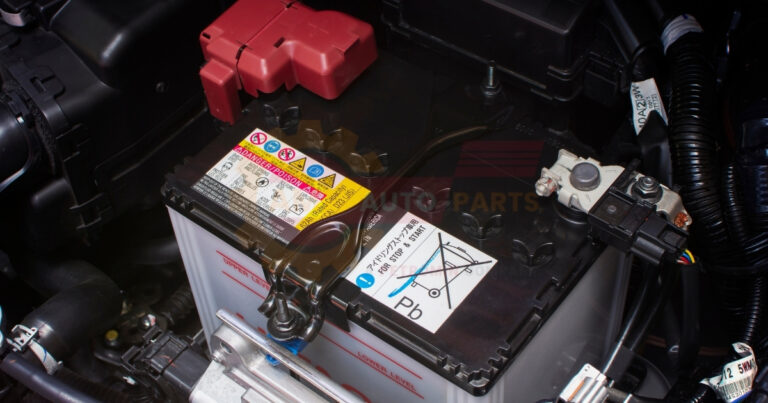What Car Battery Voltage Should Be: A Comprehensive Guide
Understanding car battery voltage is crucial for maintaining your vehicle’s health. This guide will explore what voltage your car battery should be, how to measure it, and how to ensure it stays within optimal ranges.
Car Battery Voltage Basics
A car battery typically operates at a voltage of around 12.6 volts when fully charged. This voltage is essential for starting the engine and powering electrical components. If the voltage drops below this level, it may indicate a weak or failing battery.
How much should car battery voltage be?
The ideal car battery voltage should be between 12.4 and 12.7 volts when the engine is off. This range ensures that the battery has enough charge to start the vehicle and operate its electrical systems efficiently.
What should your car battery voltage be?
Your car battery voltage should be consistently monitored to ensure it remains within the optimal range. Regular checks can prevent unexpected breakdowns and extend the battery’s lifespan.
What should car battery voltage be when off?
When the car is off, the battery voltage should be between 12.4 and 12.7 volts. This range indicates a healthy battery capable of starting the engine without issues.
- Ideal voltage range: 12.4 – 12.7 volts
- Fully charged: 12.6 volts
- Below 12.4 volts: Potential issues
The 12-Volt DC Battery Standard for Cars
Why 12 volts is the industry standard
The 12-volt standard for car batteries is widely adopted due to its balance between power and safety. It provides sufficient energy to start the engine and power accessories while minimizing the risk of electrical hazards.
Nominal voltage vs. actual voltage
Nominal voltage refers to the standard voltage rating of a battery, while actual voltage is the real-time measurement. A fully charged car battery should have an actual voltage close to its nominal value of 12 volts.
- Nominal voltage: 12 volts
- Actual voltage: 12.4 – 12.7 volts when off
- Importance: Ensures reliable performance
Measuring Car Battery Voltage
Tools needed for voltage measurement
To measure car battery voltage, you’ll need a digital multimeter. This tool provides accurate readings and is easy to use, making it essential for any car owner.
Step-by-step guide to checking battery voltage
- Turn off the engine and all electrical components.
- Set the multimeter to DC voltage.
- Connect the multimeter probes to the battery terminals.
- Read the voltage displayed on the multimeter.
- Multimeter: Essential tool
- Steps: Simple and quick
- Accuracy: Ensures reliable readings
Optimal Car Battery Voltage Ranges
Fully charged battery voltage
A fully charged car battery should read around 12.6 volts. This voltage ensures that the battery has enough power to start the engine and operate electrical systems efficiently.
Voltage during engine operation
When the engine is running, the battery voltage should be between 13.7 and 14.7 volts. This range indicates that the alternator is charging the battery effectively.
Acceptable voltage range when the car is off
When the car is off, the battery voltage should remain between 12.4 and 12.7 volts. This range ensures that the battery is healthy and capable of starting the engine.
- Fully charged: 12.6 volts
- Engine running: 13.7 – 14.7 volts
- Car off: 12.4 – 12.7 volts
Signs of Low Battery Voltage
Common symptoms of a weak battery
A weak battery often shows signs such as dim headlights, slow engine cranking, and electrical malfunctions. These symptoms indicate that the battery voltage is too low to power the vehicle effectively.
How low voltage affects vehicle performance
Low battery voltage can lead to poor vehicle performance, including difficulty starting the engine and unreliable electrical systems. Addressing low voltage promptly can prevent further issues.
- Symptoms: Dim lights, slow cranking
- Performance: Affected by low voltage
- Importance: Early detection prevents problems
Causes of Car Battery Voltage Fluctuations
Extreme temperatures can cause battery voltage fluctuations. Cold weather can reduce voltage, while high temperatures can increase it, affecting battery performance.
Role of the alternator in maintaining voltage
The alternator plays a crucial role in maintaining battery voltage by charging it while the engine runs. A failing alternator can lead to voltage drops and battery issues.
- Temperature: Affects voltage
- Alternator: Maintains charge
- Fluctuations: Can indicate problems
Maintaining Proper Car Battery Voltage
Regular voltage checks and their importance
Regularly checking your car battery voltage can help identify potential issues before they become serious. This practice ensures that your battery remains in optimal condition.
Tips for prolonging battery life
To prolong battery life, keep terminals clean, avoid short trips, and ensure the battery is securely mounted. These practices help maintain proper voltage and extend battery lifespan.
- Checks: Prevent issues
- Tips: Clean terminals, avoid short trips
- Lifespan: Extended with proper care
When to Replace Your Car Battery
Average lifespan of car batteries
Car batteries typically last between 3 to 5 years. Regular voltage checks and maintenance can help maximize their lifespan.
Indicators that it’s time for a replacement
Signs that it’s time to replace your battery include frequent jump-starts, slow engine cranking, and a swollen battery case. These indicators suggest that the battery can no longer hold a charge effectively.
- Lifespan: 3-5 years
- Replacement signs: Frequent jump-starts, slow cranking
- Importance: Timely replacement prevents issues
Troubleshooting Car Battery Voltage Issues
DIY voltage testing techniques
DIY voltage testing involves using a multimeter to check the battery’s charge. This simple process can help identify voltage issues early.
When to seek professional help
If you notice persistent voltage issues or are unsure about testing, seek professional help. A mechanic can diagnose and resolve battery problems effectively.
- DIY: Use a multimeter
- Professional help: For persistent issues
- Importance: Ensures accurate diagnosis
The Role of Alternators in Battery Voltage
Alternators charge the battery by converting mechanical energy into electrical energy. This process ensures that the battery remains charged while the engine runs.
Signs of a failing alternator
Signs of a failing alternator include dimming lights, a dead battery, and unusual noises. Addressing these issues promptly can prevent further damage.
- Charging: Converts energy
- Failing signs: Dimming lights, dead battery
- Importance: Prevents battery issues
Impact of Electrical Accessories on Battery Voltage
High-drain devices and their effects
High-drain devices like air conditioners and sound systems can significantly impact battery voltage. Using these devices excessively can lead to voltage drops.
Managing power consumption for optimal voltage
To manage power consumption, turn off unnecessary electrical accessories when the engine is off. This practice helps maintain optimal battery voltage.
- High-drain: Affects voltage
- Management: Turn off unnecessary devices
- Importance: Maintains voltage
Advanced Battery Technologies and Voltage
Lithium-ion batteries in modern vehicles
Lithium-ion batteries offer higher energy density and longer lifespan compared to traditional lead-acid batteries. They are increasingly used in modern vehicles for improved performance.
Voltage differences in hybrid and electric cars
Hybrid and electric cars use higher voltage batteries, typically ranging from 200 to 400 volts. These batteries provide the necessary power for electric motors. Battery inspection importance Checking batteries regularly helps keep devices working safely and prevents unexpected power loss It’s like giving your batteries a health check-up to make sure they’re ready when you need them Battery health percentage
Automotive electrical measurement helps check if car parts that use electricity are working right It uses special tools to test things like batteries wires and lights in vehicles Jumpstart dead battery is a quick way to get your car running again when the battery is out of power You can use special cables to connect your car’s dead battery to another car’s working battery to bring it back to life
Automotive Power Depletion happens when a car’s battery loses energy over time This can make it hard for the car to start or run its electrical systems properly Battery selection guide Choose the right battery for your device by looking at size voltage and how long it lasts
Automotive energy solutions help cars and trucks run using different power sources like electricity batteries and hydrogen fuel cells instead of just gasoline These new ways of powering vehicles can make them cleaner and better for the environment
- Lithium-ion: Higher energy density
- Hybrid/electric: Higher voltage
- Importance: Improved performance
Environmental Factors Affecting Car Battery Voltage
Extreme temperatures can affect battery voltage, with cold weather reducing voltage and heat increasing it. These fluctuations can impact battery performance.
Effects of humidity and corrosion
Humidity and corrosion can lead to poor electrical connections, affecting battery voltage. Regular maintenance can prevent these issues.
- Temperature: Affects voltage
- Humidity: Leads to corrosion
- Maintenance: Prevents issues
Frequently Asked Questions
Is 11.9 volts enough to start a car?
11.9 volts is generally not enough to start a car. A healthy battery should have at least 12.4 volts when the engine is off. If the voltage is below this level, it may indicate a weak battery.
What should car battery voltage be after driving?
After driving, the car battery voltage should be between 13.7 and 14.7 volts. This range indicates that the alternator is charging the battery effectively. If the voltage is lower, it may suggest an issue with the charging system.
Can overcharging damage a car battery?
Yes, overcharging can damage a car battery. It can lead to excessive heat and cause the battery to swell or leak. Using a regulated charger can prevent overcharging and extend battery life.
What happens if the car battery voltage is too low?
If the car battery voltage is too low, the engine may not start, and electrical systems may malfunction. Addressing low voltage promptly can prevent further issues and ensure reliable vehicle performance.
Can weather affect car battery voltage?
Yes, weather can affect car battery voltage. Cold temperatures can reduce voltage, while hot temperatures can increase it. These fluctuations can impact battery performance and lifespan.
How long does it take to charge a car battery?
Charging a car battery can take anywhere from 4 to 24 hours, depending on the charger and battery condition. A slow charger is recommended for a thorough and safe charge.
What is considered a low voltage for a car battery?
A car battery is considered low if the voltage drops below 12.4 volts when the engine is off. This level indicates that the battery may not have enough charge to start the vehicle.
Can a car battery be too high in voltage?
Yes, a car battery can be too high in voltage, which may indicate overcharging. This condition can lead to battery damage and reduced lifespan. Regular checks can help maintain proper voltage levels.
How often should I check my car battery voltage?
It’s recommended to check your car battery voltage at least once a month. Regular checks can help identify potential issues early and ensure the battery remains in optimal condition.






